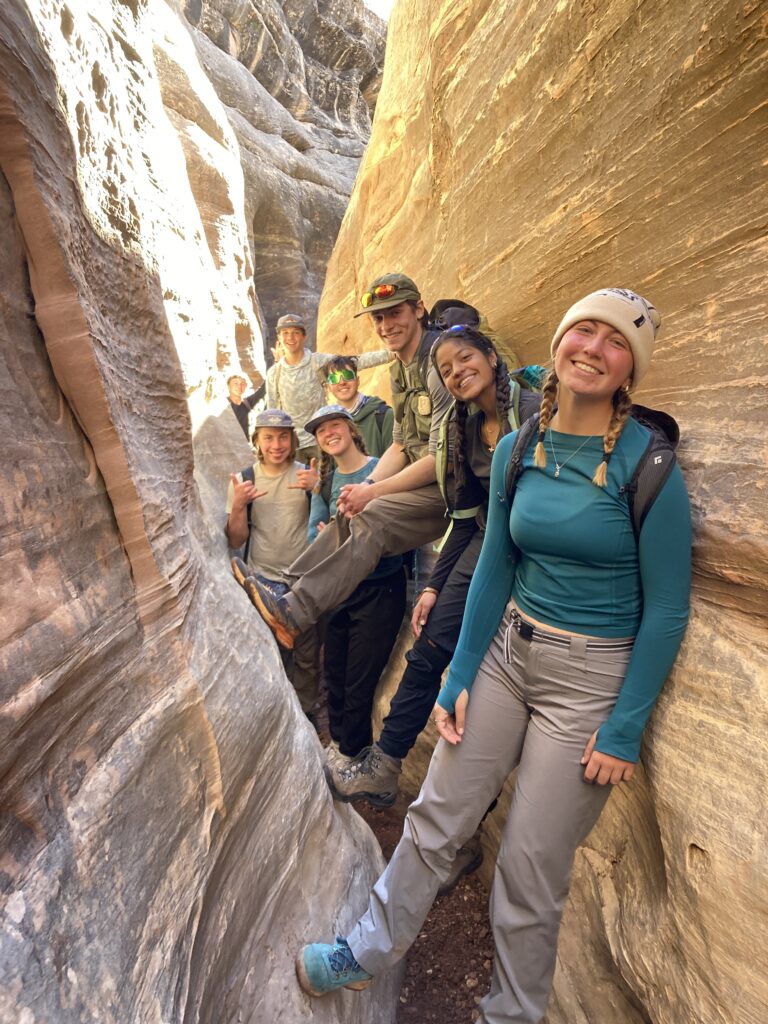
Esperanza Ashenbrenner
The SEL Experience
On our last day of Independent Student Travel (IST), we gathered in a circle on the uneven sandy ground of a drainage. Each one of us was tasked with giving ourselves and the Student Expedition Leader (SEL) a strength and a piece of growth-oriented feedback. I was the Student Expedition Leader for my group. And I was terrified. But, as we went around and everyone gave me their feedback I was surprised. “So it turns out no one secretly hates me?” Obviously I knew no one outright hated me, but there was a small part of me that was constantly worried about whether or not everyone in my group felt supported.
One of the pieces of positive feedback I received from multiple people was my ability to highlight everyone’s strengths. This was really meaningful to hear because when I was younger, I had a really hard time making my voice heard in a group. It was really special to have the opportunity to celebrate each person’s individuality in a group setting. After three expeditions, each one of us has grown in numerous ways, from navigation, to perfecting our backcountry cooking. Seeing each person contribute their strengths to the group on IST was truly a testament to the significance of the expedition experience.
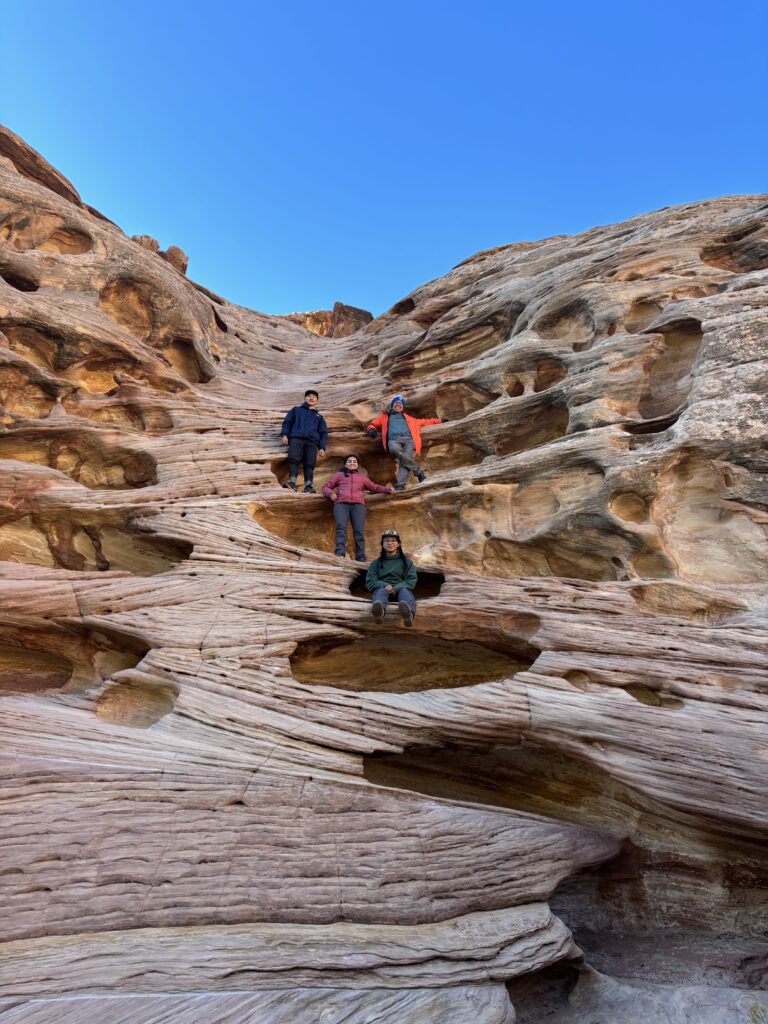
Charlie Ballenger
Getting Lost
The canyons of Utah are an unforgiving landscape, and days can be excruciatingly long. On expeditions, we hold many responsibilities. One of the most significant of these is navigation while hiking. Using a topographic map, we traverse one to seven mile days. It’s a skill that we are constantly forming, challenging, and perfecting.
One day on the third expedition, we put this skil to the ultimate test. We had successfully completed most of our day already: spirits were high, and we practically skipped along with our 60-pound packs. We planned to “handrail”, or follow along the side of the canyon, to our campsite. It was smooth sailing… or so we thought. Along our path, we practically fell into the deep ravine in front of us. It was dramatic: a gash in the desert travelling as far as we could see. We were certain this was our canyon.
Now, you might be able to guess what came next: after two miles of consent handrailing, we realized that we were lost. We were shocked; we had done everything right, from scouting both directions of the canyon, map checking from many angles, and pinpointing exactly where we thought we were. We were blindsided and we would have to retrace our steps. We looked ahead of us, at the six extra miles we had to hike, to the gaping canyon offshoot that we had to circumnavigate, and to each other’s exhausted faces.
Anyone who has gotten lost understands the feelings of weariness, frustration, confusion, and helplessness. But after a day that ended up being eight miles, we discovered an unexpected condense. Through our newfound navigational skills, we gained assurance that we could find our way through anything. And through exhausted songs, riddles, jokes, and games, we learned that you only need two things to get you through even the longest days: joy and your friends… and maybe a map.
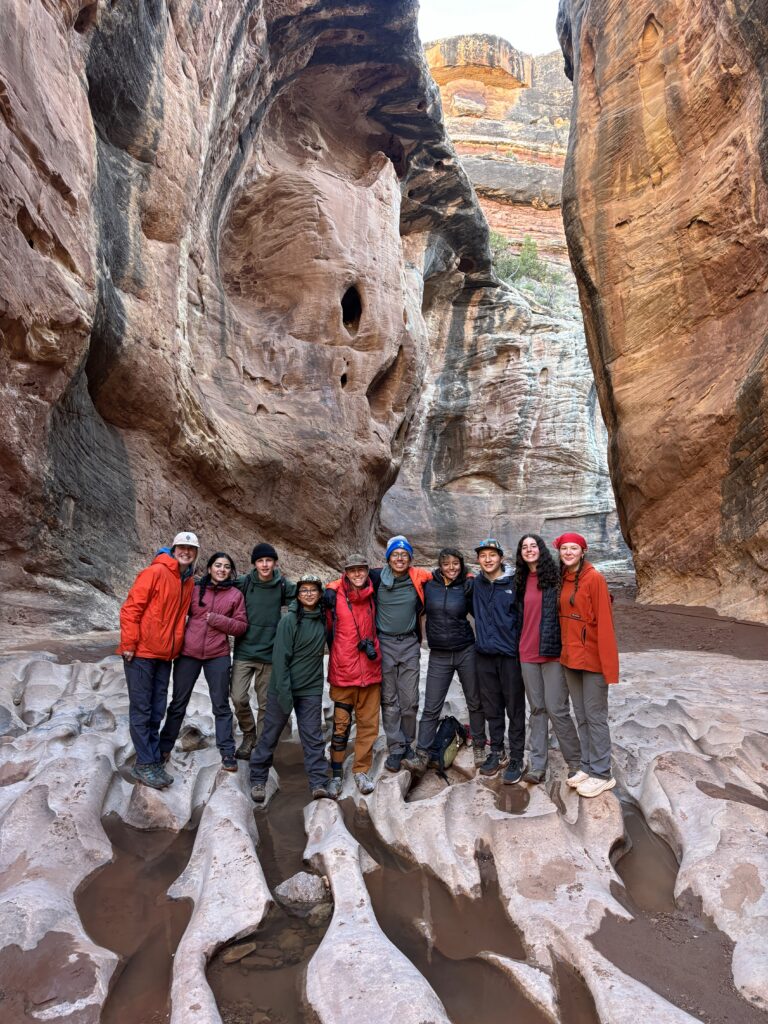
Eilish Keenan
Independent Student Travel
“Packs on backs!” Mavis says, as we get ready to start walking again. We lift our packs onto each other’s tired bodies. There wasn’t much appealing about putting our 60-pound packs back on after a whole day of hiking, especially to continue walking through the freezing wind and snow. Nevertheless, it was time to keep going. As the Leader Of the Day (LOD), I had to stay strong and determined, even if I wasn’t feeling either of those things.
We continued walking along the edge of the canyon, condent in our navigation skills, until we weren’t. We stopped and saw something moving on the other side of the canyon: it was our Instructor Team. We had completely turned around and were on the wrong side of the canyon. There was no other option but to turn around and go all the way back the way we came—about six extra miles more than anticipated. It was beginning to get late, we were running low on water, and we knew we had to keep moving, no matter how defeated we felt.
So, with no one but each other to lean on, we supported one another and did our best to stay positive. Determined to reach camp, we pushed forward, distracting each other with life stories, singing, and jokes, until we finally dropped our packs for the last time that day.
This situation was a very common occurrence on IST, but despite how challenging it was, we had each other. We struggled, learned, and grew—not just independently, but as a whole. Independent Student Travel was one of the most frustrating and hardest things I have ever done, but also one of the most rewarding and special experiences of my life. Through the struggle, I formed bonds I never would have expected and had an absolute blast.
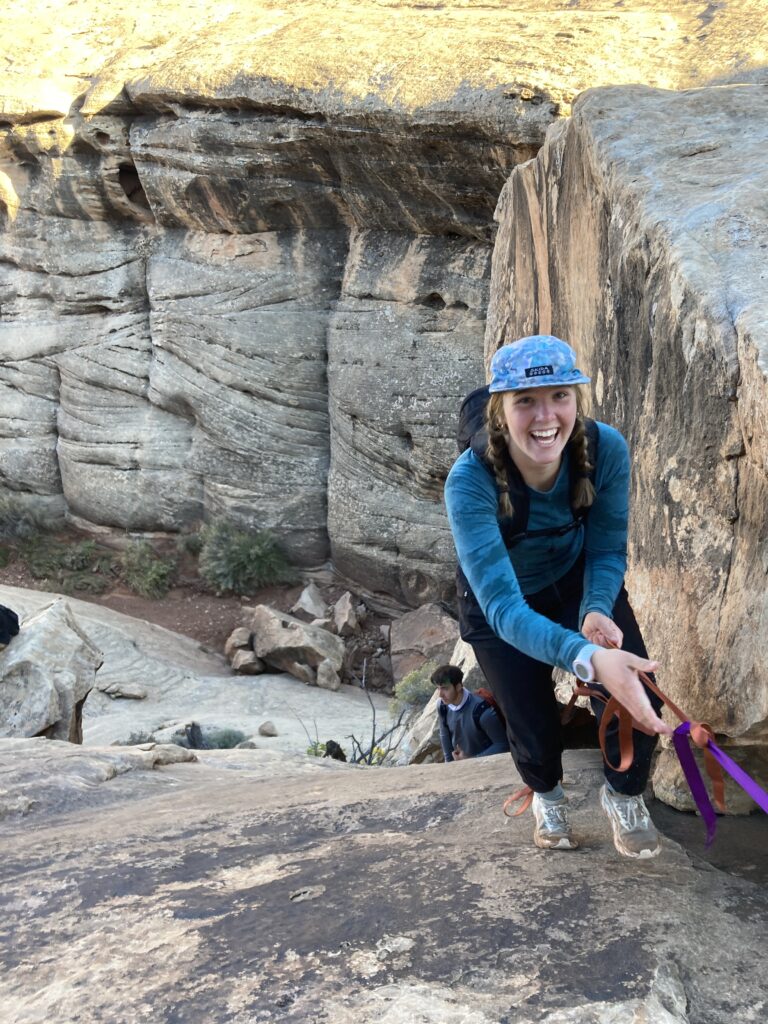
Lucas Kimak
Bonding Time
My personal favorite part of expedition is “Circle”; this is where we all gather together in a circle and talk about life. Through Circle, I connected with all my friends so much more, learning details about them that I would have never known if it wasn’t for this awesome opportunity. During circle time we have “Circle,” which is the part where someone asks a question and everyone goes around in a rotation and shares their responses. I love to hear the different responses from everyone; it leads to other conversations throughout our time. One question, from Third Exped that really stood out to me, is “What is something you value about yourself and why?” I love these questions because they help us to step outside our comfort zones, and I admire people’s passion toward their answers.
Eli Klagsbrun
Before third expedition, I had no idea what the food would be like. I had been too injured to go on the first two expeditions, so the only reference I had for what I’d be eating for the next eleven days was talk about “cheesy hashbrowns,” “gado-gado,” and some pretty gross sounding moldy broccoli: none of which was particularly positive.
So, as I’m sure you can imagine, I was a bit worried about the food in the days leading up to departure. However, when my group and I went to the Rations Room on prep day, I started to feel a bit more confident about how I was about to be fed. The inclusion of a bag of spices in our ration was certainly a good sign (that I, for whatever reason, was not expecting). Finally getting into the backcountry and cooking for the first few times in our “gritchen” (group kitchen) was such an incredible community forming experience for my exped group that always resulted in some, while not always incredibly delicious, very filling and tasty food.
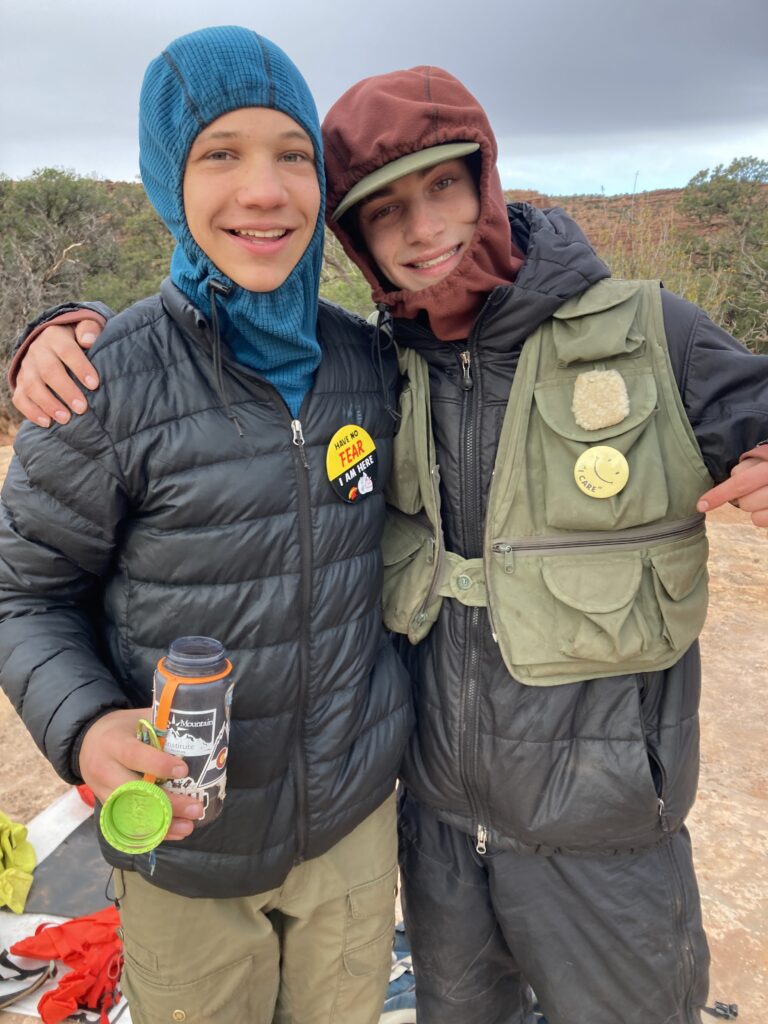
Edie Menard
Homesickness is Awesome
First off, it is not embarrassing, lame, childish, or abnormal to miss your parents. Let’s be real, HMI is challenging in more ways than one. Pushing myself out of my comfort zone is one of the main reasons I came here. The obstacles I faced, whether getting lost, putting mashed potato powder in my hot chocolate instead of milk powder, or enduring a snowstorm in the desert, were all hard, but they also made me feel accomplished. Even so, these hard times can lead to hard feelings, specifically about being homesick. After a long exhausting day, there were times when all I wanted to do was hug my mom and dad or smother my dog in hugs.
When going into our first expedition, all I thought about was the amazing adventures and connections I would create. I never expected the possibility of getting homesick. Because I go to boarding school back in Massachusetts, I was so confident in my independence. So it came as a shocker when a couple of days in, I started to bawl my eyes out, wanting to hitchhike back to my hometown. I initially felt I was doing the expedition wrong. Shouldn’t I always be happy with smiles, joy, and laughter? Isn’t that what having an amazing time on an expedition means?
Oh, how I was wrong. Like I said, there will be times when you feel like giving up and wanting to go home to hug your parents, but what I found to be imperative is expressing your emotions. Cry a little and open up to a friend, expedition leader, or advisor. I learned that my peers and teachers were there for me and that everyone feels a little negative sometimes. I remember towards the end of the trip, I felt a sudden wave of homesickness when my whole cook group was making dinner. They all started to make jokes and laugh with me, instantly making my sadness turn into tears of joy. I don’t know if it was a coincidence but we had an amazing dinner that night. In other words, if you can’t get out of your emotions, get into them!
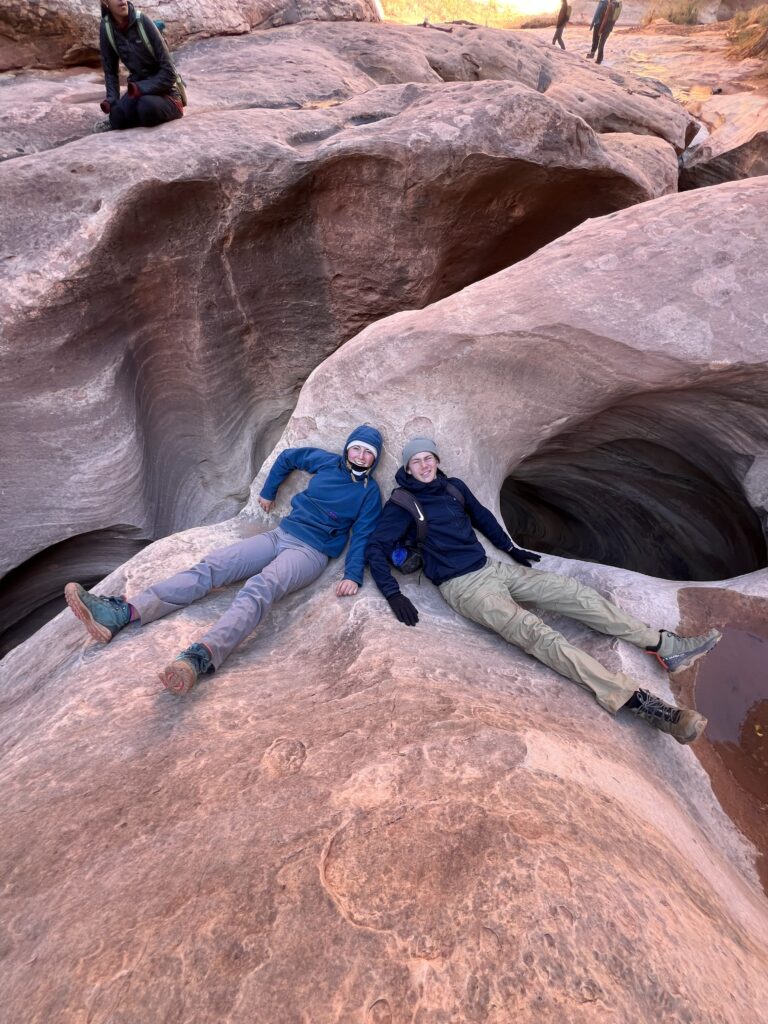
Roxie Plavidal
There’s something about backpacking through the canyons of Utah that feels like stepping into another world. I remember my first night in the backcountry, exploring Long Canyon, and being truly in awe of the sun dipping behind the towering red mesa. The sunsets in these canyons are like nothing else I’ve seen. As the sky transforms into a canvas of oranges, pinks, and purples, the rocks come alive, glowing with a eerie intensity. The air is still, but there’s a kind of energy in it, something that pulls you deeper into the landscape, making you feel small, yet incredibly connected to everything around you.
What I love most about backpacking in Utah’s canyons, though, is the way laughter echoes through the walls. After a long day of hiking, the sound of my friends’ voices would bounce off the canyon walls, filling the vast emptiness. There’s something about being so far from everything that makes those moments feel richer, more meaningful. In those canyons, you feel the immensity of the world, but you also feel a deep sense of belonging like you’re part of something much bigger than yourself.
Isaac Yukica
Bonding in the Canyons
Building relationships in the outdoors is one of HMI’s most valuable opportunities. The chance to leave the intense academic atmosphere of campus to get better acquainted with a small group helps us focus on each other as individuals. On trail days, hiking in small groups of 3-5, we have plenty of time to chat, play games, and to hear each other’s life stories. Particularly hard days are the best, because nothing brings people together like pushing through physical adversity.
On Third Expedition, my group went for a day hike in a Slot Canyon. The going was tough; we had to descend a steep canyon wall, balance in the slot to climb over water, and scale ten-foot boulders for a couple of hours. But the difficulty made it so special. We eagerly ran to each new challenge, taking in the beauty of the canyon walls. Every time we encountered a serious obstacle, we paused and helped one another to make it to the other side. It was such a powerful display of teamwork and mutual love for adventure.
However, the backcountry also poses unique challenges to relationships. Spending so much time with just a few people in a harrowing environment isn’t always easy. Sometimes people sleep through their cooking responsibilities, or lead their hiking group in the wrong direction. On Third, my group found that Independent Student Travel (IST) was particularly difficult. Once all decision making responsibilities were entirely within our hands (and split between ten assertive personalities), people began to butt heads. After our first day without the instructors, we were feeling worn down and upset. But, despite everyone’s desire to go to bed, our student leader called a mandatory meeting. IST forces students to work through group issues and practice active leadership and followership. The conversation was hard, but we confronted our problems directly and pursued open communication. It was a difficult balance to strike, and we were far from perfect. But after that day, we seriously turned things around and made it a trip to remember.